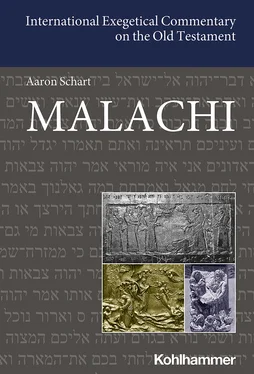The name “Malachi” is difficult to interpret. If it was a short form of one of the common Hebraic theophorical phrases מלאכי would mean “my/a messenger (is Yhwh).” The most likely association would be with the conveyance of the good news of a successful birth. While such a message would have been brought by a human agent, the joyful news would point to its true author—God—who caused the birth to be successful.
If this is a proper name that need not mean that the core of the Malachi document can be traced to a historical person bearing that name. 7The personal name may have commended itself as applicable to the author because the title מלאכי appears twice within the writing itself—in secondary additions. In Mal 2:7 it is applied to the priestly calling, something not properly related to a prophetic writing. In Mal 3:1 the title is given to a person who prepares for Yhwh’s coming. The combination of the superscription with that passage would yield “See, I am sending Malachi,” in which case the prophet Malachi would himself be the messenger who prepares the way for God, perhaps precisely by calling the people to repentance (Mal 3:7). 8Even if we see that interpretation as improbable, it is certainly a wordplay on the prophet’s name.
The name “Malachi” is introduced by the prepositional phrase ביד, literally “by the hand,” which adopts the formula in Hag 1:1. Odil Hannes Steck has pointed out that the formula bǝyad “is applied to Moses, Joshua, and prophets, both individual figures and collectives, concentratedly and materially to the transmission of Yhwh’s commandment and the announcement, in particular, of Yhwh’s judgment, but also of salvation.” He then asks whether “Malachi [is] then seen both materially and literarily as the last in a series of mediators of the word of Yhwh (Moses, Joshua, prophets) that runs through the Torah and Nebiim?” 9Such a series of prophets is also explicitly given in 2 Chr 36:15–16, where the preposition bǝyad is likewise used.
Absence of situation A comparison with other prophetic superscriptions shows that in Mal 1:1 there is no reference to the situation in which the word of God was given. That is remarkable since the writings of Haggai and Zechariah, also postexilic, contain very precise datings of the individual sayings. It may be that the authors of the superscription thought the words of the Malachi document reflected phenomena and conflict that were not tied to a specific historical situation but might be repeated in many such situations throughout time.
Superscriptions are seldom among the oldest elements of a text because their necessity appears only in the course of its being written down. In the case of Mal 1:1 it is striking how little the two generic terms applied suit the unique form of the writing. The Malachi document is characterized by disputation speeches, and no such thing can be found in Zechariah 9–14. In spite of that, Zechariah 9–11; 12–14; and the Malachi document bear the same generic designation, “weighty speech.” There is also the question whether the two parts of the superscription belong together literarily or whether they were introduced at separate stages. Since they cannot be combined in a way that makes sense, they may well have been added by different redactors. Because the generic term משׂא does not fit a collection of disputation speeches it would have been chosen as a superscription in order to connect the Malachi document with Zech 9:1 and 12:1. 10As for the disputed question whether the Malachi document was added to the Zechariah writing when the latter still ended with Zechariah 8 or after chapters 9–14 had already appended to the collection, the generic usage in Mal 1:1 speaks in favor of the latter hypothesis.
Likewise the second generic concept of דבר־יהוה, “word of Yhwh” refers back to the superscriptions of preceding parts of the Book of the Twelve (Hos 1:1; Joel 1:1; Mic 1:1; Zeph 1:1), which suggests that it, too, was chosen in the context of incorporating the Malachi document into the Book of the Twelve Prophets. Certainly the concept of “the word of Yhwh” fits well with the frequent ’āmar Yhwh ṣǝbā’ôt formula. Though certainly it may also have been inserted secondarily, it still presumes an independent literary Malachi composition.
Both parts of the superscription make it clear that the intent was to direct the reader’s attention back from descriptions of the eschatological final events to contemporary observance of the cult and keeping the Torah in daily life: to whatever degree the lively and impressive images of hope for the decisive turning of history on the day of Yhwh may resied in the minds of the audience, in the end everything still depends on preserving the faith in the present.
Summary Interpretation (Synthesis)
The superscription in Mal 1:1 ties the final document into the collection of the Book of the Twelve Prophets. The number twelve suggests a certain completeness, analogous to the idea that the people Israel is made up of twelve tribes. In addition, there may be a reference to the analogy by which the three “great” prophetic books are related to the twelve “minor” books as the patriarchs Abraham, Isaac, and Jacob are to Jacob’s sons. 11Independently of whether that was the original authorial concept, it is a fact that the Hebrew canonical series of prophets ends with Malachi. That need not mean the end of prophecy, but future prophetic figures must be able to present themselves as interpreters of canonical prophecy or as fulfilling prophetic sayings about the future if they are not to fall under suspicion of being false prophets (cf. Zech 13:1–6).
The superscription of the Malachi document combines, for the first and last time, the two most important generic concepts (משׂא and דבר־יהוה) contained in the openings of the prophetic writings that precede it. This makes it clear that both genres—the “weighty words” that have been primarily directed against foreign nations and the “word of Yhwh” are mutually enhancing, and in such a way that the weighty speech is one aspect of the word of Yhwh.
The Malachi document presumes the end of the exile In accord with the structure of the Book of the Twelve Prophets, the Malachi document presupposes the end of the Babylonian exile and the rebuilding of the temple. The superscription makes it clear that there is a link to preexilic prophecy; the exile has not made prophecy superfluous. The suggestion is that the two most important speech genres are again in use. The great spiritual turn in Israel that was the goal of the exile remains incomplete, because even now that the temple is again in use there are conditions that call for criticism and Malachi must once more call for return (Mal 3:7).
But if we look more closely at what, in fact, is expressed in terms of the old generic categories, we find a consequential change: while the prophet still appeals to Yhwh’s authority to support his preaching, the prophet’s words are now directed at counter-questions and toward questioning, doubting countenances (not described, but to be imagined) that face the prophet. These are what drive him, again and again demanding explanations and additional “arguments” from him.
Does “Israel” also include the Diaspora? Likewise the fact that the concept of “Israel” appears in a superscription after the Babylonian exile should cause us to give pause. That Israel continues to exist, even after the exile, implies that the God of Israel holds fast to the people of God, even beyond the time of its punishment. Still, we must ask ourselves what the name “Israel” now represents: certainly no longer the preexilic Israel, understood as a kingdom, but rather for a renewed Israel that has endured exile. Nowhere can we find a distinction between those who remained in the Land and those who were taken away to Babylon. It is difficult to say whether the Diaspora is included in the name “Israel.” According to Mal 1:5, Israel is a circumscribed geographical entity. Yet, according to Mal 2:11a, it is a community that is to be distinguished from Judea and Jerusalem. In Mal 2:16 and especially 3:22 [4:4 ET]), which speak explicitly of “all Israel,” it is Yhwh’s covenant partner. The last two passages may well include the worldwide Diaspora, even though that is not said explicitly. 12
Читать дальше












